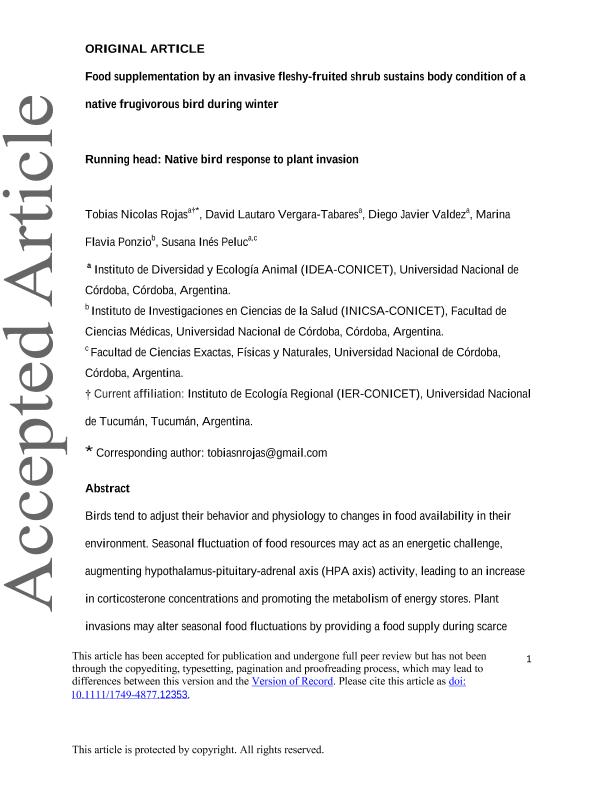Mostrar el registro sencillo del ítem
dc.contributor.author
Rojas, Tobias Nicolas

dc.contributor.author
Vergara Tabares, David Lautaro

dc.contributor.author
Valdez, Diego Javier

dc.contributor.author
Ponzio, Marina Flavia

dc.contributor.author
Peluc, Susana Ines

dc.date.available
2021-02-23T20:20:15Z
dc.date.issued
2018-07
dc.identifier.citation
Rojas, Tobias Nicolas; Vergara Tabares, David Lautaro; Valdez, Diego Javier; Ponzio, Marina Flavia; Peluc, Susana Ines; Food supplementation by an invasive fleshy-fruited shrub sustains body condition of a native frugivorous bird during winter; Wiley-Blackwell; Integrative Zoology; 14; 3; 7-2018; 259-269
dc.identifier.issn
1749-4869
dc.identifier.uri
http://hdl.handle.net/11336/126377
dc.description.abstract
Birds tend to adjust their behavior and physiology to changes in food availability in their environment. Seasonal fluctuation of food resources may act as an energetic challenge, augmenting hypothalamus–pituitary–adrenal axis (HPA axis) activity, leading to an increase in corticosterone concentrations and promoting the metabolism of energy stores. Plant invasions may alter seasonal food fluctuations by providing a food supply during scarce seasons. This could attenuate the energetic challenge, reducing HPA axis activity and the metabolism of reserves. Using a system with seasonal fluctuation in food availability, we tested if fruit supplementation by the invasive fleshy-fruited Pyracantha angustifolia during the season of native fruit scarcity decreases the consumption of energy stores through activity attenuation of the HPA axis. We measured changes in body condition and circulating corticosterone (CORT) concentration in Turdus chiguanco occurring at sites both invaded and not invaded by P. angustifolia over 3 time periods that correspond to the periods prior to, during and after highest fruit production of the plant. Fruit scarcity in the ecosystem appears as an energetic challenge for T. chiguanco, given that body mass, fat score and residuals of body mass/tarsus length decreased during winter in a site not invaded by the exotic shrub. Conversely, the presence of the invasive plant seemed to attenuate the metabolism of energetic reserves, as we did not record changes in body condition in birds inhabiting the invaded site. Unexpectedly, plasma CORT concentration did not vary between sites or periods. Further evaluation is required to elucidate how enhanced body condition, resulting from the consumption of a fleshy-fruited invasive plant, affects survivorship and reproductive performance in T. chiguanco.
dc.format
application/pdf
dc.language.iso
eng
dc.publisher
Wiley-Blackwell
dc.rights
info:eu-repo/semantics/openAccess
dc.rights.uri
https://creativecommons.org/licenses/by-nc-sa/2.5/ar/
dc.subject
BIOLOGICAL INVASION
dc.subject
ENERGETIC RESERVES
dc.subject
FOOD FLUCTUATION
dc.subject
FRUGIVORY
dc.subject
PLASMA CORTICOSTERONE
dc.subject.classification
Conservación de la Biodiversidad

dc.subject.classification
Ciencias Biológicas

dc.subject.classification
CIENCIAS NATURALES Y EXACTAS

dc.title
Food supplementation by an invasive fleshy-fruited shrub sustains body condition of a native frugivorous bird during winter
dc.type
info:eu-repo/semantics/article
dc.type
info:ar-repo/semantics/artículo
dc.type
info:eu-repo/semantics/publishedVersion
dc.date.updated
2020-11-19T21:12:18Z
dc.identifier.eissn
1749-4877
dc.journal.volume
14
dc.journal.number
3
dc.journal.pagination
259-269
dc.journal.pais
Estados Unidos

dc.description.fil
Fil: Rojas, Tobias Nicolas. Universidad Nacional de Tucumán. Instituto de Ecología Regional. Consejo Nacional de Investigaciones Científicas y Técnicas. Centro Científico Tecnológico Conicet - Tucumán. Instituto de Ecología Regional; Argentina
dc.description.fil
Fil: Vergara Tabares, David Lautaro. Consejo Nacional de Investigaciones Científicas y Técnicas. Centro Científico Tecnológico Conicet - Córdoba. Instituto de Diversidad y Ecología Animal. Universidad Nacional de Córdoba. Facultad de Ciencias Exactas Físicas y Naturales. Instituto de Diversidad y Ecología Animal; Argentina
dc.description.fil
Fil: Valdez, Diego Javier. Consejo Nacional de Investigaciones Científicas y Técnicas. Centro Científico Tecnológico Conicet - Córdoba. Instituto de Diversidad y Ecología Animal. Universidad Nacional de Córdoba. Facultad de Ciencias Exactas Físicas y Naturales. Instituto de Diversidad y Ecología Animal; Argentina
dc.description.fil
Fil: Ponzio, Marina Flavia. Consejo Nacional de Investigaciones Científicas y Técnicas. Centro Científico Tecnológico Conicet - Córdoba. Instituto de Investigaciones en Ciencias de la Salud. Universidad Nacional de Córdoba. Instituto de Investigaciones en Ciencias de la Salud; Argentina
dc.description.fil
Fil: Peluc, Susana Ines. Consejo Nacional de Investigaciones Científicas y Técnicas. Centro Científico Tecnológico Conicet - Córdoba. Instituto de Diversidad y Ecología Animal. Universidad Nacional de Córdoba. Facultad de Ciencias Exactas Físicas y Naturales. Instituto de Diversidad y Ecología Animal; Argentina
dc.journal.title
Integrative Zoology
dc.relation.alternativeid
info:eu-repo/semantics/altIdentifier/url/https://onlinelibrary.wiley.com/doi/epdf/10.1111/1749-4877.12353
dc.relation.alternativeid
info:eu-repo/semantics/altIdentifier/doi/https://doi.org/10.1111/1749-4877.12353
Archivos asociados
